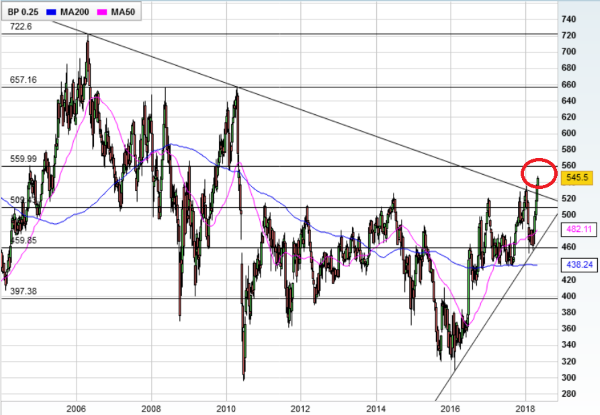Booming BP backed to go higher
1st May 2018 12:46
by Graeme Evans from interactive investor
Share on
For a second quarter in a row, has put its two big rivals and in the shade thanks to better-than-expected results.
Profits of $2.6 billion (£1.9 billion) were the highest since the crude oil price averaged above $100 dollars a barrel in 2014, with the headline earnings figure for the first three months of 2018 also 71% higher than a year earlier.
But where BP particularly impressed in comparison with Shell was in the resilience of its cash flow performance, with $3.6 billion recorded for the quarter, up from $2.1 billion a year ago. That was despite the final $1.2 billion payment under the 2012 US Department of Justice criminal settlement, part of $1.6 billion in costs relating to the Gulf of Mexico oil spill.
BP shares have risen 14% in the past month and consolidated those gains today to keep the blue-chip stock at its highest level since 2010. In contrast, Shell fell as much as 3% last week after a weaker-than-expected cash flow performance.
Despite the upbeat BP performance, many brokers clearly believe they are up with events. UBS has a price target of 550p, while in the run-up to these results Kepler Cheuvreux and Morgan Stanley cut their price targets to 530p and 505p respectively. Analysts at HSBC were more optimistic, increasing to 590p.
Even the interactive investor community has gone cold on BP recently, with the usually popular stock only the ninth most bought on our platform in March.
One concern for investors has been the oil giant's debt pile, which climbed to $40 billion in the first quarter, compared with $38.6 billion a year earlier. Gearing, which measures the ratio of debt to equity, was 28.1% at the end of March.
BP expects gearing to come down later this year as payments of $3 billion in relation to the Gulf of Mexico spill are likely to be weighted towards the first half of 2018, supplemented by proceeds from divestments. So far, the oil spill has cost the company $65.97 billion since the incident in April 2010.
The cash flow performance has become the key benchmark for investors as they look to BP, Shell and others to share the benefits of the higher oil price.

Source: interactive investor Past performance is not a guide to future performance
Shell's failure to restart buy-backs last week was badly received in the City, following the company's stated intention to buy at least $25 billion (£18 billion) of shares over the period 2018-2020.
BP said it repurchased 18 million ordinary shares at a cost of $120 million during the first quarter of 2018, as part of a programme announced in October to offset the dilutive effect of scrip dividends. Today's quarterly dividend was unchanged at 10 cents per share.
As well as benefiting from a Brent crude oil price that averaged $66 in the first quarter, BP also reported a strong operational performance.
Output from upstream exploration and production, excluding Rosneft, was up 9.1% in the quarter, helped by the ramp up of seven projects launched in the last year. Upstream plant reliability was 96%, the best quarterly performance on record.
As chief financial officer Brian Gilvary said: "It's not just about the price, it's actually about the performance of the kit."
Furthermore, BP's result from the downstream refining and trading segment was higher than expected at $1.8 billion.
UBS's price target of 550p is based on a 2019 EV multiple of 6.6x if oil prices are at $60 a barrel. This ratio represents a 13% premium to the five-year average and implies a 2019 projected dividend yield of 5.2%.
Analyst Jon Rigby said that "visible progress" had been maintained in the quarter.
These articles are provided for information purposes only. Occasionally, an opinion about whether to buy or sell a specific investment may be provided by third parties. The content is not intended to be a personal recommendation to buy or sell any financial instrument or product, or to adopt any investment strategy as it is not provided based on an assessment of your investing knowledge and experience, your financial situation or your investment objectives. The value of your investments, and the income derived from them, may go down as well as up. You may not get back all the money that you invest. The investments referred to in this article may not be suitable for all investors, and if in doubt, an investor should seek advice from a qualified investment adviser.
Full performance can be found on the company or index summary page on the interactive investor website. Simply click on the company's or index name highlighted in the article.